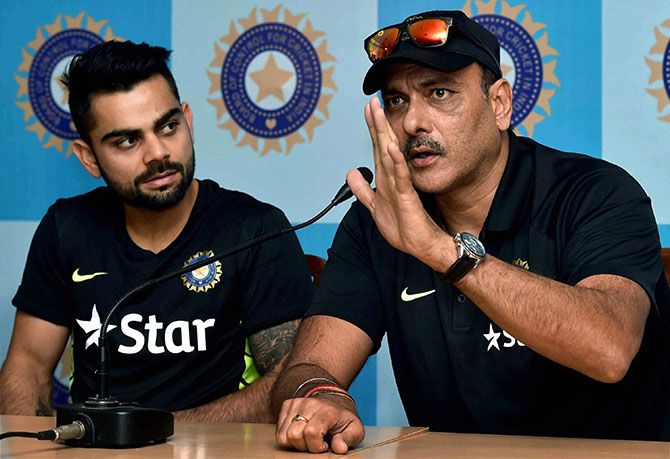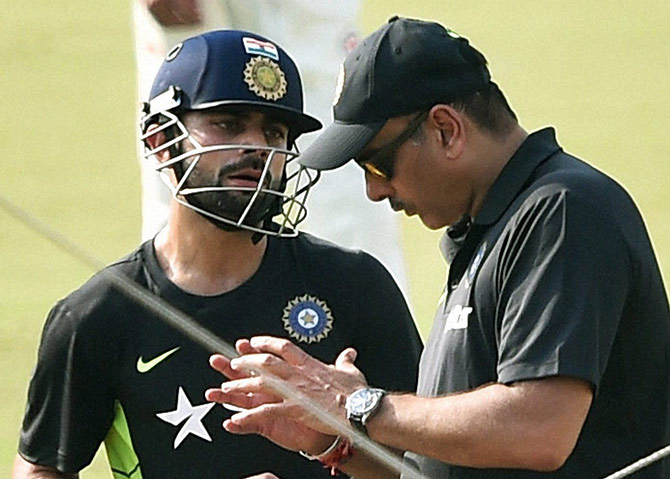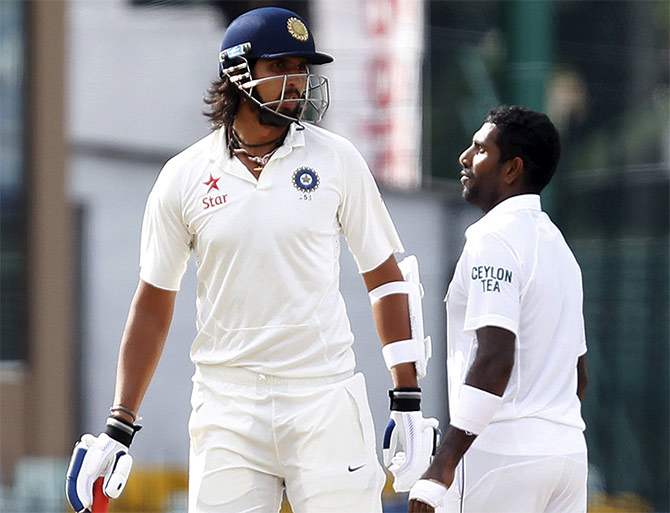 | « Back to article | Print this article |
'When a wicket falls, it means the batsman has failed and the bowler has succeeded, but it's the bowler who is angry for some reason
'Why should anger follow success?
'When the anger of the victor is aimed at the vanquished, it's a brawl waiting to happen'

Former India batsman Sanjay Manjrekar has questioned Team Director Ravi Shastri and Test captain Virat Kohli's philosophy of aggression following the Ishant Sharma incident, which resulted in a one-Test ban for the lanky Delhi fast bowler.
"I am a bit concerned with the Virat Kohli-Ravi Shastri partnership. That the Indians are not trying to tone their behavior down after Australia, and have got into ugly confrontations with even a team like Sri Lanka, tells me that they don't see these actions as misdemeanors at all," wrote Manjrekar, in his column for ESPNCricinfo.
There was a bit of sarcasm in his article about what he believes is a misplaced sense of aggression.
"Perhaps this is all part of their new brand of aggressive cricket. If that's the case, it does not make any cricketing sense at all. For this version of aggressive cricket has cost India the services of their strike bowler, a player who is in great form, in a crucial Test match," Manjrekar added, referring to the one-Test ban on Ishant, which will see the bowler miss the opening game against South Africa, at Mohali.
'Why didn't aggression win you games in Australia?'

The 50-year-old Manjrekar, who played 37 Tests and 74 ODIs for India between 1987 and 1996, asked why aggression did not win the team games in Australia if that is a requisite element for winning matches.
"But India may say, "We won the series, and this is what you need to be a winning team - a bit of aggression." A simple retort would be: "Why didn't aggression win you games in Australia?"
Manjrekar seemed equally disturbed about these trend of send-offs by the fast bowler.
"What I can't fathom about these send-offs is: when a wicket falls, it means the batsman has failed and the bowler has succeeded, but it's the bowler who is angry for some reason. Why should anger follow success? When the anger of the victor is aimed at the vanquished, it's a brawl waiting to happen."
'Ishant was keen to have a go at Prasad, but Virat stopped him'

The Mumbaikar also referred to an incident involving Ishant that did not catch the attention of television cameras.
"There was one instance right towards the end of the last Test that the TV cameras did not show. Prasad came out to bat in the second innings, with India within arm's reach of a win.
"Ishant was on high, having got India back into the game with a superb spell with the second new ball, in which he picked up the big wicket of Angelo Mathews. Believe it or not, Ishant was still keen to have a go at Prasad, but Virat Kohli stopped him.
"That moment told me that, one, Ishant was not willing to learn a lesson on his own, and two, that perhaps - and this is speculation - he was not talked to sternly enough by the team management for him to have dared repeat the offence."
- Also read:
- Ishant incident: Why didn't Kohli play mediator?
'If Ishant crossed the line it's because of Kohli's aggressiveness'